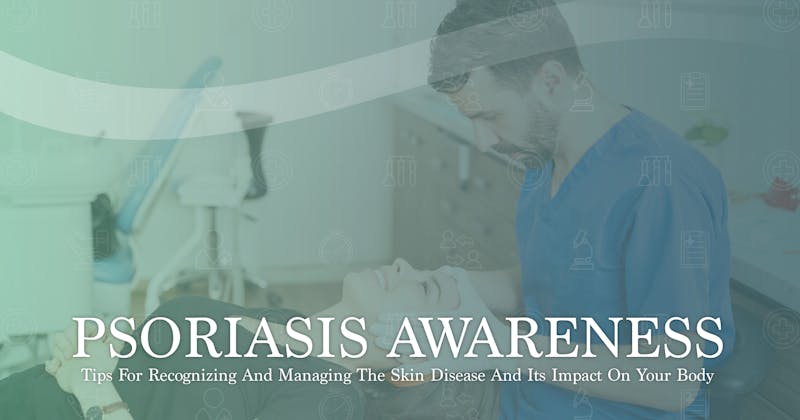Your Family Deserves the Best Care Book an Appointment
Your skin health matters, so don’t delay. Our clinicians look forward to treating you and your family at one of our local New England practices.
Find Your Nearest APDerm Center
Psoriasis is not just a skin disease. It is an autoimmune condition that can have widespread systemic effects, which are best described in skin, joints, and heart. Dermatologists have many tools to help manage the disease and in many cases make it appear to be gone, but there is currently no cure.
August is Psoriasis Awareness Month, making it is a good time to have an annual skin checkup and learn about signs and symptoms of this persistent inflammatory skin disease.
Psoriasis is common yet chronic skin condition characterized by itchy plaques, scaly rashes and red or dry patches of skin and caused by an overactive immune system. The condition has been linked to genetics, immunity, and environmental triggers.
According to the National Psoriasis Foundation:
Both heredity and an overactive immune system play a key role in developing psoriasis. Researchers have identified a certain subset of T lymphocytes, a type of white blood cell, that produce inflammatory chemicals that cause skin cells to multiply and grow too quickly.
These T cells set off other immune responses, producing changes in small skin blood vessels and the scaling and plaques associated with psoriasis. The red rashes and scaly skin can be problematic for those with the condition, but psoriasis is not contagious and cannot be passed through skin-to-skin contact.
There are a few telltale signs of the skin condition:
Psoriasis can develop anywhere on the body but commonly affects the elbows, knees, belly button, buttocks and scalp. It also shows up on the legs, back, nails, and the palms or soles of the feet. An outbreak can last for weeks or months, and it is a condition that can clear up and then reappear.
In addition, a variety of environmental factors may increase risk or aggravate the condition:
Some sufferers report the condition gets worse in the winter and improves in warmer months, warmer climates, or with increased sunlight exposure.
Plaque psoriasis is the most common form. Roughly 80 to 90 percent of sufferers are diagnosed with this type. In addition to inflamed, scaly skin, plaque psoriasis is associated with psoriatic arthritis. Symptoms include painful inflammation of the joints that can lead to stiffness in the mornings and progressive joint damage. Plaque psoriasis can include fissures, or splits, in the skin, as well as bleeding and infection.
In addition, many patients are predisposed to obesity, diabetes, cardiovascular diseases, and eye conditions, which is why it is important to get the condition under control and avoid environmental triggers.
Left untreated, plaque psoriasis can evolve into more severe forms of the disease. Pustular psoriasis results in raised bumps with pus-filled blisters and often affects the hands and feet. Guttate psoriasis looks like red drop-like lesions on the skin and fine scales on the lesions. With erythrodermic psoriasis, a bright red, itchy and inflamed rash covers most of the body (about 90%).
Don’t delay a visit to the dermatologist if you think you may have psoriasis. Your doctor can work with you to develop a plan of care and assess environmental triggers and other lifestyle factors that could be making the condition worse.
Topical and systemic treatments can ease irritation, improve the appearance of the skin, and help manage flare-ups, but it requires continuous therapy to control it. Topical treatments can be applied directly on the affected skin to help with inflammation and irritation, whereas oral medications or a shot have more system-wide effects. Phototherapy, or regular doses of moderate sunlight, may help reduce psoriasis lesions.
For many cases, treatment options include:
There are also treatments that affect the entire body. including pills and injectable medications.
Lifestyle changes such as moisturizing, quitting smoking, reducing alcohol, dietary changes, and managing stress may reduce psoriasis. Paying attention to what is in products and switching to chemical-free soaps and cosmetic products can also help with flares and outbreaks.
Some people try natural remedies, herbs, and vitamins for relief. Epsom salts and Dead Sea salt baths, aloe vera, fish oil, and cayenne, along with a variety of essential oils, may improve symptoms of psoriasis.
The good news is there are effective treatment options available. You don’t have to hide, keep your skin covered, or avoid social situations. Most skin conditions, especially chronic ones like psoriasis, need to be monitored and managed by a board-certified dermatologist.
APDerm employs highly trained dermatologists that specialize in medical, cosmetic, and surgical dermatology services. Schedule an appointment today and start living with clearer skin!